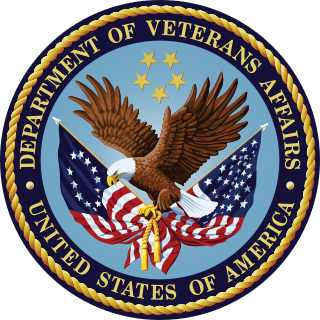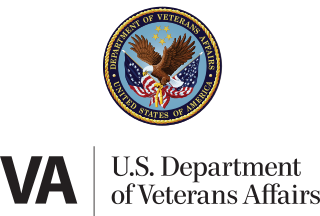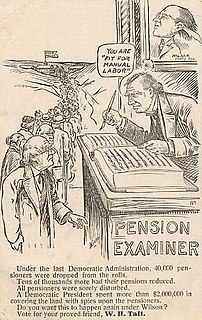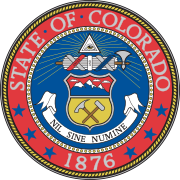
The Servicemen's Readjustment Act of 1944, commonly known as the G.I. Bill, was a law that provided a range of benefits for returning World War II veterans. The original G.I. Bill expired in 1956, but the term "G.I. Bill" is still used to refer to programs created to assist U.S. military veterans.

The United States Department of Veterans Affairs (VA) is a federal Cabinet-level agency that provides near-comprehensive healthcare services to eligible military veterans at VA medical centers and outpatient clinics located throughout the country; several non-healthcare benefits including disability compensation, vocational rehabilitation, education assistance, home loans, and life insurance; and provides burial and memorial benefits to eligible veterans and family members at 135 national cemeteries.
According to the United States Government Accountability Office (GAO), there are 1,138 statutory provisions in which marital status is a factor in determining benefits, rights, and privileges. These rights were a key issue in the debate over federal recognition of same-sex marriage. Under the 1996 Defense of Marriage Act (DOMA), the federal government was prohibited from recognizing same-sex couples who were lawfully married under the laws of their state. The conflict between this definition and the Due Process Clause of the Fifth Amendment to the Constitution led the U.S. Supreme Court to rule DOMA unconstitutional on June 26, 2013, in the case of United States v. Windsor.
A VA loan is a mortgage loan in the United States guaranteed by the United States Department of Veterans Affairs (VA). The program is for American veterans, military members currently serving in the U.S. military, reservists and select surviving spouses and can be used to purchase single-family homes, condominiums, multi-unit properties, manufactured homes and new construction. The VA does not originate loans, but sets the rules for who may qualify, issues minimum guidelines and requirements under which mortgages may be offered and financially guarantees loans that qualify under the program.
The Veterans' Preference Act is a United States federal law passed in 1944. It required the federal government to favor returning war veterans when hiring new employees in an attempt to recognize their service, sacrifice, and skills.

The Veterans Benefits Administration (VBA) is an agency of the U.S. Department of Veterans Affairs. It is responsible for administering the Department's programs that provide financial and other forms of assistance to veterans, their dependents, and survivors. Major benefits include Veterans' compensation, Veterans' pension, survivors' benefits, rehabilitation and employment assistance, education assistance, home loan guaranties, and life insurance coverage.
Social Security Disability Insurance is a payroll tax-funded federal insurance program of the United States government. It is managed by the Social Security Administration and designed to provide income supplements to people who are physically restricted in their ability to be employed because of a notable disability. SSD can be supplied on either a temporary or permanent basis, usually directly correlated to whether the person's disability is temporary or permanent.

The Disabled American Veterans (DAV) is an organization created by the United States Congress for disabled military veterans of the United States Armed Forces that helps them and their families through various means. It currently has over 1 million members. As a 501(c)(4) social welfare organization, it is outside the purview of – and therefore not rated by – Charity Navigator.
Florida held various statewide elections on November 7, 2006.

A veteran's pension or "wartime pension" is a pension for veterans of the United States Armed Forces, who served in the military but did not qualify for military retired pay from the Armed Forces. It was established by the United States Congress and given to veterans who meet the eligibility requirements. Along with payments, they are also given additional benefits depending on their eligibility and needs.
The 2007 Texas Constitutional Amendment Election took place 6 November 2007.

California's state elections were held November 3, 1992. Necessary primary elections were held on March 3. Up for election were all the seats of the State Assembly, 20 seats of the State Senate, and fifteen ballot measures.

Colorado Amendment 51 was a citizen’s initiative proposed by Wendy B. Rosanova of Centennial, CO, and Marijo Rymer, executive director of The Arc of Colorado. It was turned down by 62.4% of the voters. If it had passed, Amendment 51 would have amended the Colorado statutes to:

The Oklahoma state elections were held on November 4, 2008. Votes for the Presidential Primary were cast on February 5. The primary election for statewide offices was held on July 29, and the runoff primary election was held August 26.

The Florida Department of Veterans' Affairs (FDVA) is a government agency of the state of Florida under the authority of the Governor of Florida charged with helping veterans and their families to receive all benefits they are legally entitled to.

The United States has compensated military veterans for service-related injuries since the Revolutionary War, with the current indemnity model established near the end of World War I. The Department of Veterans Affairs (VA) began to provide disability benefits for post-traumatic stress disorder (PTSD) in the 1980s after the diagnosis had become part of official psychiatric nosology.
The 2010 Virginia State Elections took place on Election Day, November 2, 2010, the same day as the U.S. House elections in the state. The only statewide elections on the ballot were three constitutional referendums to amend the Virginia State Constitution. Because Virginia state elections are held on off-years, no statewide officers or state legislative elections were held. All referendums were referred to the voters by the Virginia General Assembly.
The 1976 Virginia State Elections took place on Election Day, November 2, 1976, the same day as the U.S. Presidential, U.S. Senate, U.S. House elections in the state. The only statewide elections on the ballot were six constitutional referendums to amend the Virginia State Constitution. All referendums were referred to the voters by the Virginia General Assembly.
The 2018 Virginia State Elections took place on Election Day, November 6, 2018, the same day as the U.S. Senate and U.S. House elections in the state. The only statewide election on the ballot were two constitutional referendums to amend the Virginia State Constitution. Because Virginia state elections are held on off-years, no statewide officers or state legislative elections were held. The referendum was referred to the voters by the Virginia General Assembly. The amendment easily passed, although final vote totals await the final certification of results by the state board of elections.









